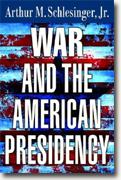Arthur M. Schlesinger, Jr.
book reviews:
· general fiction
· chick lit/romance
· sci-fi/fantasy
· graphic novels
· nonfiction
· audio books
· author interviews
· children's books @
curledupkids.com
· DVD reviews @
curledupdvd.com
newsletter
win books
buy online
links
home
for authors
& publishers
for reviewers

 |
War and the American Presidency Arthur M. Schlesinger, Jr. W.W. Norton Hardcover 224 pages September 2004 |
|
Dissent is currently under fire, the dissenters accused of increasing the danger for our troops in Iraq; recent statements from Washington indicate that such outspoken criticism may border on the treasonous. Schlesinger's book is a timely response to such assertions, as the author cites specific historical incidents to make a strong case for the necessity of open dialog in the service of the democratic process.
Certainly, it is human nature to prophesy the future from the experiences of the past, but it is also critical to realize that preventive war depends upon accurate intelligence. The future will not yield itself to the vision of one man or one nation; hence, extreme caution is imperative. We must constantly monitor the inherent dangers of power and the arrogance it breeds. The question arises: do we use historic perspective to create insight or justification for a specific agenda? The last president to exercise the concept of "imperial presidency" was Richard Nixon, who upset the balance of power with an excessive executive branch via foreign policy decisions combined with a lack of congressional oversight and the aid of the attorney general. But Osama bin Laden reopened the doors of imperial presidency for our generation, John Ashcroft at the helm, promoting the Patriot Act I and II, which must offer open debate by the Congress before any restrictions are made on the freedoms we enjoy. If war does nurture the concept of the imperial presidency - and certainly the events of 9/11 have made the public more vulnerable and willing to take direction from our elected representatives - do a democratic people have a moral obligation to stop dissent during wartime? Is this the example shown by our forefathers? And, in a nation born of dissent, what is the nature of patriotism? Schlesinger answers all these questions in detail. The answers are surprisingly informative, certainly worth consideration. "The great strength of democracy is its capacity for self-correction." In the final analysis, history documents the nature of dissent in this country and the fact that no president has been sacrosanct, war or not. Dissent is viable in a democracy, dialog the lifeblood of citizenship. Schlesingerís book offers an overview of our rich history of dissent and the reliable lessons of experience. Stimulating curiosity in pursuit of lively discussion is never a waste of time. © 2004 by Luan Gaines for curledup.com. |
|
|
|
 Click here to learn more about this month's sponsor! |
|
| fiction · sf/f · comic books · nonfiction · audio newsletter · free book contest · buy books online review index · links · · authors & publishers reviewers |
|
| site by ELBO Computing Resources, Inc. | |
 The current preemptive doctrine that allowed the invasion of Iraq is worthy of careful consideration. While military might is no substitute for wisdom, Schlesinger suggests that it can only accomplish limited goals. When peace sought through the prevention of war is replaced with peace via preventive war, an entirely different prospect is created, with its own inherent problems. In earlier times, even Truman opined the foolhardiness of a concept that war can only be prevented by war, "You can't 'prevent' anything by war except peace."
The current preemptive doctrine that allowed the invasion of Iraq is worthy of careful consideration. While military might is no substitute for wisdom, Schlesinger suggests that it can only accomplish limited goals. When peace sought through the prevention of war is replaced with peace via preventive war, an entirely different prospect is created, with its own inherent problems. In earlier times, even Truman opined the foolhardiness of a concept that war can only be prevented by war, "You can't 'prevent' anything by war except peace."